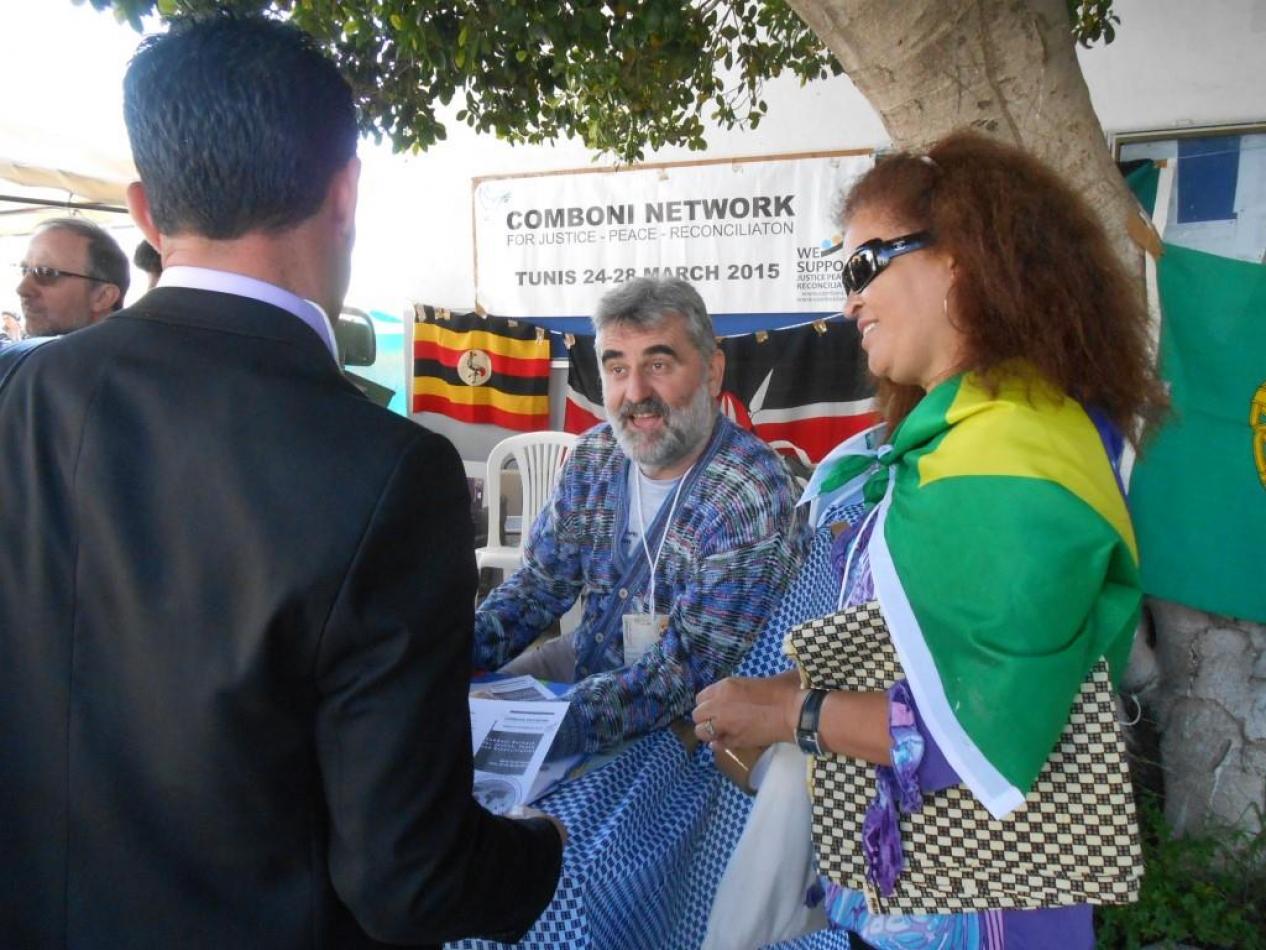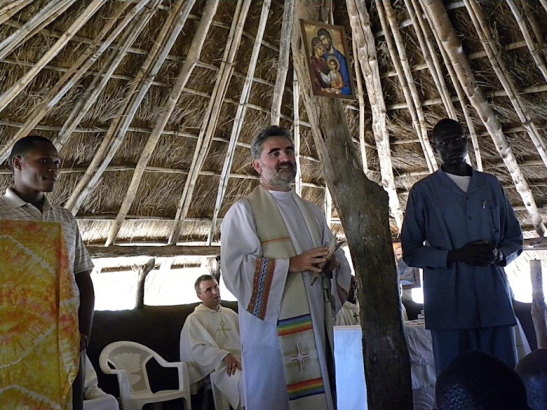Daniel Comboni
Comboni Missionaries
Institutional area
Other links
Newsletter
Thursday, July 26, 2018
The youngest African nation is being torn apart by a civil war that has already caused 300 thousand deaths and two million refugees. The missionaries are with the people, witnesses of terrible atrocities. “Today – explains Fr. Daniele – the heart of Africa experiences a humanitarian disaster of frightening proportions. The war has already killed 300 thousand people and caused 2 million refugees. We need to aim our spotlights on this forgotten crisis.”
The planes of the world food program fly over villages isolated by the war to drop help from the sky. Hundreds of civilians, hungry and exhausted, rush to intercept the parcels. But the relief is short lived: it ends with the sinister noise of military helicopters on patrol. Then everyone rushes into hiding. Rounds of bullets may hit the straw roofs of the huts. “People’s lives are hanging by a thread,” bitterly comments Comboni Father Daniele Moschetti, with seven years spent in that tormented country, who is now visiting Italy to promote his book on South Sudan: the long and suffered path towards peace, justice and dignity (preface by Pope Francis, Editions Dissensi, pp. 250, €14). “I wrote it to send out the cry of sorrow of a voiceless people.”
A shattered hope
“Today – explains Fr. Daniele – the heart of Africa experiences a humanitarian disaster of frightening proportions. The war has already killed 300 thousand people and caused 2 million refugees. We need to aim our spotlights on this forgotten crisis.” But the European diplomats have run away from Juba, and so have the reporters who, up to a few short years ago, were telling the story of the youngest nation in the world. The “Country of Hope” – born in July 2011 after 50 years of bloody conflicts and a referendum legitimizing its secession from Sudan – has become and infernal place. “We are the witnesses of terrible atrocities. Thousands of women have been raped, children are castrated and burned alive in their huts. There is no trace of humanity left,” narrates Fr. Moschetti in a shaken voice, and he is not easily shaken. Before moving to South Sudan, he spent 11 years in Kenya, side by side with Fr. Alex Zanotelli and then taking over from him in the shantytown of Korogocho.
The unrest started 24 months after the declaration of independence. The institutions designed to build the country from ground zero were too frail, the ruling class chosen to govern after many wars was inadequate and divided. The situation worsened in the summer of 2013 when President Salva Kiir, a Dinka, deposed his vice Riek Machar, a Nuer, under the accusation of having plotted against him. The soldiers faithful to their respective political leaders clashed in what looked like a tribal conflict that in a short time degenerated into civil war.
In January 2015, after two weeks of negotiations, the government and the rebels signed a cease-fire. But it did not last. In July 2016, a new wave of violence erupted in Juba, the capital, and in the surrounding areas, causing the exodus of tens of thousands of people. A drought complicated the humanitarian crisis and hundreds of people died.
Towards the abyss
The rest is daily news. “The conflict seems to have crystalized – explains Fr. Daniele – Each family has had its own dead, people have to be on the run or depend on humanitarian aid.” Who is responsible? First of all the political leaders, mostly military leaders, who have shown to be unable to work for the common good.” Power struggles have weakened the national identity and fractured the fragile balances of a large territory deprived of infrastructures, populated by 64 ethnic groups and destabilized by foreign interferences. “The post is made up of the vast strategic resources of South Sudan: water, fertile soil, oil and who knows how many strategic minerals.”
Armed conflict is everywhere. Crimes against civilians are perpetrated by both rebel militias and regular army, in a spiral of violence and acts of revenge that is leading the country to the abyss. Only the presence of the UN Blue Helmets prevents worst evils. Yet, daily we hear news of new massacres. “Besides the health workers in refugee camps, only priests and sisters of parishes and missions have remained to bring help and comfort to the people, even though they live in ever increasing situations of insecurity.”
“It will rise again”
About half of the population is Christian, Catholic and Protestant, while the rest professes traditional religions. Pope Francis and the Anglican Archbishop Justin Welby had to cancel the ecumenical visit planned for last October. The National Council of Churches, an organization made up of the main religious bodies of the country, the main party involved in peace and dialogue treaties, was relying heavily on this trip of the two spiritual leaders.
“Unfortunately minimum security measures for having it were not there – explains Fr. Moschetti – and probably the conviction and full accord within the local Church was also missing. But the Pope has told me that he wants to visit South Sudan in 2018. It would be a great blessing for the people. Catholic and Anglicans join in looking at the Holy Father with great veneration. It would be a sign of great communion. Today, more than ever, we need unity and reconciliation between religions, tribes, in the military. The young, in particular, are tired of war. To dilute hatred and forget the traumas will take time. But I feel sure that South Sudan will know how to leave behind this nightmare, will rise and will be reborn from its ashes.”
(Olivier Banda – photography by Bruno Zanzottera)
July 12, 2018





